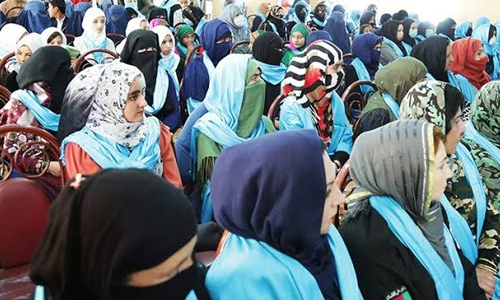There cannot be true democracy unless women’s voices are heard. There cannot be true democracy unless women are given the opportunity to take responsibility for their own lives. There cannot be true democracy unless all citizens are able to participate fully in the lives of their country. Human rights are women’s rights, and women’s rights are human rights. Let us not forget that among those rights are the right to speak freely — and the right to be heard,” these words were spoken by former US Secretary of State Hillary Clinton.
This view that women are somehow inferior to men is not restricted to one culture or belief. It is widespread. Women are prevented from playing a full and equal role in many societies. Moreover, women suffer many challenges such as gender bias, violence, sexual harassment, and etc. all around the world.
At their most repugnant, the belief that women must be subjugated to the wishes of men excuses slavery, violence, forced prostitution, genital mutilation and national laws that omit rape as a crime. But it also costs many millions of girls and women control over their own bodies and lives, and continues to deny them fair access to education, health, employment and influence within their own communities.
The impact of these patriarchal beliefs touches every aspect of our lives. They help explain why in many countries boys are educated before girls; why girls are told when and whom they must marry; and why many face enormous and unacceptable risks in pregnancy and childbirth because their basic health needs are not met.
Afghan girls and women suffered greatly under traditional customs. Their role was restricted within the four walls and they were considered as a pariah, especially in remote areas where traditional mindsets held strong sway. They suffered physical and mental tortures in one way or another. For instance, when a girl denied living with a man of her parents’ choice under the same roof, she was considered brazen and deserved to be punished in a severe way. After all, if she dared elope with a man of her own choice, she was deemed a disgrace for her family.
Although there are still some barriers ahead of women’s progress and their rights and freedoms are still at stake, the nascent democracy led to great changes. On the basis of the Constitution, which was approved in 2004, men and women are equal before the law and have the same rights and responsibilities. Constitutionally, discriminating women on the basis of her sex is not acceptable.
Afghan women played a constructive role in the community and the names of heroines are recorded in the history for their active role and heroic acts. Women supported men during wars and heartened them to fight for the protection of their national values and human dignity at the cost of their lives. Although the patriarchal system and parochial mindsets, which are deeply embedded in Afghans’ culture, restricted the women’s role and marginalized them from social and political activities, the prominent role of women is undeniable.
Women, including Queen Soraya Tarzi, took active part in social and cultural arenas during Amanullah Khan’s regime and ran the Ershad Neswan Journal (1922). In a gathering, when Soraya talked about the development and progressive movement of women around the world and regressive movement of Afghan women, women shed bitter tears and 50 women volunteered, forthwith, to engage in educational activities and founding the first female school (Mastoorat School).
Although Afghan women play active part in social and political ground, the Taliban fighters still pose threat to them and spill their blood to deter them and impose their ideology on them. It is hoped that Afghan women will be able to exercise their rights and freedoms under the nascent democracy and the state will have to empower them and protect their life and liberty.
To lessen the anguish of Afghan women, the religious figures and clergy will have to enlighten women’s fundamental rights according to the true spirit of religious tenets so that they can root out wrong traditions deeply implanted in our culture. Meanwhile, the government must protect women’s rights through enforcing law and campaigning against the radical mindsets. Violators of women’s rights and liberty should be also prosecuted on the basis of law.
Home » Opinion » Women’s Role and Cultural Restrictions
Women’s Role and Cultural Restrictions
| Hujjatullah Zia

